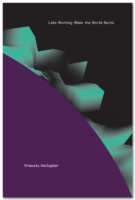
Smyth-sewn paperback · 94p · $20 · 9780999491249
In her lush, insistent debut, Shamala Gallagher fashions the portrait of a restless soul in a rooted South. Dedicated to her neighbors and flush with friends, Late Morning When the World Burns is set in Athens, Georgia, on Herman Street, in the Chicopee-Dudley neighborhood, site of a former Confederate armory. “Someone’s slave-pain loose / in the soil,” the book confronts whiteness and complicity, empathy and social disparities, madness and sobriety, aging and “the most reckless / making,” motherhood. The other, here, is closer to the speaker than she is to her self, which suffers violence at its own hands to continue coming into being. But the locus of these poems is also an Eden, where she and her husband Adam reside, though far from the promises of Genesis. With “the world / a frail hull” of police brutality, hurricanes, and dying reefs, this volume is a lyric mantra for forestalling the world’s demise. By turns surreal, allegorical, and factual, these intimate poems writhe in a haze, like cigarette smoke on a humid porch, at midnight in April, in Dixieland, “end-stuck” with uncanny desire and awake to face “a fascinating // crisis of light.” — Andrew Zawacki
To enter these poems is to step into a baroque architecture whose ceiling has come down, dismantled in fragments and glittering dust. Look up, says the poet, to see the night these poems expose: “In every black there is / violet. I am speaking to you, // violet. When you come to the / precipice of your life and sit / in the dark.” Here is the vertiginous danger and lure of the edge that marks the work of Gallagher. Her lines create a vibratory music between the austere and the rich excess of a night that can dampen our “late morning” in this city aflame. Notice, she says, “how the mouths of us grow large” to take in such a nectar. — Carolina Ebeid
“Night is a sweet eyelet / I want to belong to this world,” Gallagher sounds a clarion call from this knock-out of a first book. This book is for you, for me as we stand in the “green broken country” of apocalyptic climate change and entrenched partisanship. Through limpid and incantatory verse, this book uplifts us all as lovers, friends, schoolmates, family, but most of all, as neighbors occupying a shared soil that records everything. With immense delicacy, Gallagher has issued us a lamentation, prophecy, a love letter, an invitation around a burning question: What does it mean to demand to live now with eyes full open? — Sarah Gambito
